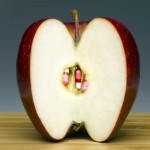Counting Calories? Texture Counts Too
 No matter how many diets you try you will probably always come back to the same conclusion: it’s the calories that really count. And it does make sense; the less you put in your mouth, the less your body stores as fat and the more your body is likely to use existing fat stores, helping you to lose weight.
No matter how many diets you try you will probably always come back to the same conclusion: it’s the calories that really count. And it does make sense; the less you put in your mouth, the less your body stores as fat and the more your body is likely to use existing fat stores, helping you to lose weight.
However, new research shows that it isn’t just the amount of calories in food that can make you gain weight, but how those calories behave once we’ve eaten them. Add to that the fact that food labels and diet books often give inaccurate information, and it is no wonder that sometimes, when we try to go it alone on a calorie controlled diet, it is harder than we thought.
The odd calorie here and there really does count. Just 19 calories more a day can make you gain 2lbs a year, which could equate to over 80lbs in your adult life.
Texture Counts
We all know that the best way to keep your weight healthy is to maintain a diet of 2000 calories a day. The problem is, it is not always east to gauge how many calories you are taking in as different food counts differently.
For example, high protein foods are thought to need 20 times as much energy to process as fats. Sugary and highly processed foods need very little energy to process them, meaning that they barely need any calories to digest them. So a 100 calorie piece of chocolate is actually worth a lot more than a 100 calorie piece of chicken.
This is not reflected on food labelling, as them only show the amount of calories present in food, not the amount of calories it will take your body to process it. So whilst a crunchy peanut butter sandwich on rye bread may contain the same calories as a smooth peanut butter sandwich on white, the crunchy sandwich takes much more energy to process, so will, overall, provide fewer calories than the white sandwich.
As a general rule, soft food or highly processed foods will take much less energy to digest than crunchy, natural food. The tip is, the more you have to chew, the harder it is to digest, so the more calories it will take up!
This explains why raw food seems to have fewer calories than cooked food. The cooking process breaks down the structure of the food, making it easier to digest but also meaning that the calories within the food are more easily accessible.
It could also explain why, despite the fact that we appear to eat fewer calories on average than our counterparts in the 1970s, we still continue to gain weight; it’s not just the calorie content that matters, but the amount of work our body has to do to process that food once we have eaten it.
What Can You Do?
If you are trying to lose a bit of weight, before or after weight loss surgery, the best thing to focus on is quality and not quantity. Steer clear of fast food, even if a small burger and fries or small pizza does have the same calorie content as a big plate chicken stir fry with crunchy vegetables and brown rice. Remember that every crunch is a calorie burnt, and try to stick to lightly cooked, homemade food and a well-balanced diet.
At Angeles Health we offer a wide range of weight loss surgery options for you, so that we can help you to find the best possible bariatric surgery for your age, health and weight. If you are considering weight loss surgery and would like to speak to one of our world class bariatric doctors about the best surgery for you then contact us today.


